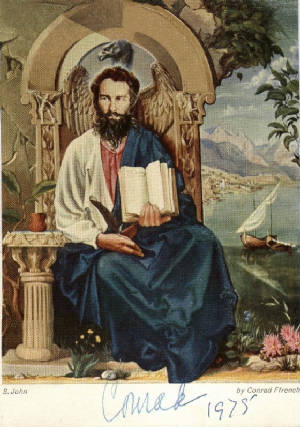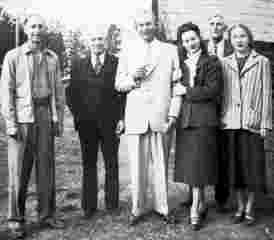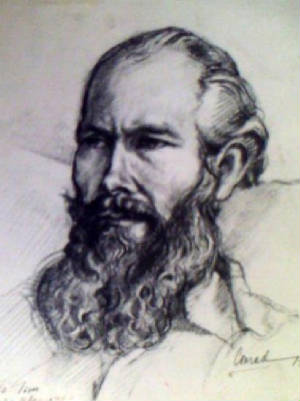Never
again would he be able to act as a secret agent as he had been for MI6. He was
a marked man and useless in any undercover operation against the Nazis. The
Death List reproduced in Peter Fleming’s book Invasion 1940 was compiled at
this time. Conrad’s name appears on it at number 28. Its inclusion was surely a
nod to his former spymaster. Conrad settled his affairs in Britain and resigned from SIS. He then
looked to finding a home for himself. He had long since decided that he would
return to Canada to live. In March 1939, he sailed to New
York on the Queen Mary and after a long
leisurely journey he came again to British
Columbia. Through friends, he was shown a
property called Arbutus Point on Maple Bay overlooking the Pacific which came
with a large plot of land. He bought it and proceeded to make it his own. But
war was imminent and he had the intention of offering his services in some
capacity when it finally broke out. He mentions meeting. During this time, he
met Lord Martin Cecil. He was involved in the creation of spiritual movement
with a Lloyd A. Meeker, the movement’s leader, who was called by them ‘Uranda’.
The Ministries of Divine Light (also known as the Ontologists) were to become a
crucial influence on Conrad. He recalls going to his first lecture by Uranda in
Vancouver on 15
April
1940. He
was intrigued and attracted by his lecture, and through subsequent
correspondence and meetings with Cecil and Uranda, Conrad was drawn closer and
closer to the movement.
When war
came, Conrad made plans to return to London to seek some war work. He left
Arbutus Point in the care of an old Finnish sailor, Fred Bjerkbom. Fred was
quite a colourful character, full of yarns about the sea. These usually began
in a seaport tavern with plenty of grog and a good fight to finish them off;
they all seemed to end with Fred being carried drunk back aboard his ship just
as it cast off. Conrad himself cast off on May
10th 1940 aboard the SS Scythia bound for England.
Back in London, Parliament was having a sticky
time dispensing with the services of the Prime Minister, Neville Chamberlain,
as Conrad took turns at submarine watch, his binoculars fixed on the horizon.
Safely in London, he met Rudolfo again. He had been with King Leopold and
had details of the actual facts behind the collapse of Belgium. He also said much of Hitler’s
designs for the invasion of Britain, which later proved to be a true
appraisal of the plans the Nazis had in place. MI6 were aware of his
intelligence. It was pleasing for Conrad to see his friend and to know he was
safe and still in the intelligence loop.
Conrad was
offered a choice of jobs and accepted one as Inspecting Officer of Censorship.
He had the whole of Scotland as his area. It involved inspecting
firms and individuals who had applied for export permits to countries under the
scrutiny of the British Wartime Censor. Scotsmen did not like having to open
their ledgers to Government officials and Conrad spent much time smoothing
ruffled feathers both before and after his investigations. The hours were long
and there was no secretarial support, so he was up till the wee small hours
typing and collating his reports. He says he worked every day for six months to
bring the records up to date. From Maple Bay, he heard that Fred had suffered a
stroke and was in hospital paralysed. He sent word that he was to be given
anything he required. He was to learn later that Fred had requested a bottle of
Champagne and that he had died in a very
contented frame of mind.
Conrad was
lodging in a village pub in East Kilbride in the hills to the east of Glasgow. Unknown to Conrad this was on the
route the Luftwaffe flew when bombing the Clyde. On his first night he was roused
at two in the morning by the wailing of air raid sirens – his first experience
of an air raid. He leapt out of bed and hurriedly pulled his clothes on in the
darkness, banging his head and skinning his shins in the process, only to find
when he burst out onto the street that he was alone. The bombers were heading
for Glasgow. The sky became streaked with
tracers of the anti-aircraft batteries and the air was filled with the
deafening reports of bombs as Glasgow suffered another raid.
He was in
many air raids after this. One of the worst occurred while he was in South
Kensington visiting an American Ambulance
Corps. It was one of the worst raids on the capital of the war. He says the
house jumped and rocked as the bombs fell, plaster falling from the ceiling and
causing general panic in the room. After the raid in East
Kilbride, he disdained the dugout shelter
in the basement. He reasoned he would rather die outright than be slowly buried
under the wreckage of the house had it suffered a direct hit.
“I remained
seated in my chair, unswayed by
the human emotion rampant about me, coldly and determinedly preserving my sense
of identity. I felt I must at all costs not become subject to the hell that was
set loose around me.” (DM p. 208)
Radiating a
stoic self assurance he sat calmly
in his chair. A young nurse called Crookie crawled to where he sat and held his
hand and was comforted as the raid did its worst. A few months later, he was
caught in another raid in Edinburgh and stepped
into a doorway to
avoid falling shrapnel. In the reflected light from the searchlights he saw he
shared the doorway with a girl wearing the uniform of the American Ambulance
Corps. “Alright, alright, it’s only me!” said Crookie. He hoped they might not
meet under these circumstances every time. They became friends, but despite
Conrad’s impulses they were never to become lovers.
In April
1941, Conrad was summoned to London by his boss and given new orders.
He was to go to Trinidad as an Imperial Censor. He decided to go by way of Arbutus Point to see
all was well after Fred had died. He sailed aboard a whaler this time. A few
days out, they heard news of the sinking of the Bismarck; it was May
27th 1941.
Arbutus Point was in very good order. He met Martin Cecil and continued his
conversations about the Ministries. It was just after Pearl Harbour, when, in early 1942, he
eventually made for Trinidad. Trinidad
was crowded, and Americans, who
had established a base there, had all the good rooms. However, the mention of
‘Imperial Censor’ seemed to work like magic and he found a place. His work as
Censor was different here as they were also dealing with passengers passing
through the ports of Trinidad. He tells of a young Indian girl of about sixteen he
shared a night of passion with.
“A flower
of India, her pretty face framed in a sari
. . . Never had I seen such beauty . . . The lemon-coloured sari had slipped
back from her dark hair. Gold ornaments adorned her small neck and ankles. She
gazed at me steadfastly and presently her eyes burned like fire. . . . Her
heavenly face, her body so thinly veiled, made me want to merge with it. . . . Sweet
and involuntary influence seized us, breaking through the thin hedge of
resistance into a warm and smooth paradise.” (DM pp. 223-224)
This
romantic encounter was to live in his memory and cause him pangs of both desire
and regret – perhaps not quite the same attitude Bond had to his conquests.
Generally, though, he spent his spare time bird watching, and he did some
paintings and drawings. One of his relatives, he says, was the author of a book
on Caribbean
birds – an interesting aside,
albeit he gives no details. The eminent ornithologist James
Bond’s book on Caribbean birds is long recognised as the source of the name of ‘007’. Bond’s
book was full of excellent photographs and it became the recognised authority?.
Is it possible that the book it superseded was by an author called ffrench?
Conrad
fell ill with malaria in the summer of 1942, and in October he resigned and
decided to return to England. Again he went via Arbutus Point
and was delighted by the Scottish couple he had placed there as caretakers.
They had painted and varnished the house and everything was in perfect order.
Yet, he felt something was still missing. After many delays, he set off for England perhaps with Crookie in his
thoughts.






